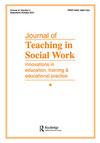社会工作领域教育中以黑人为中心的工具:一个反种族主义机构学习计划与评价
IF 0.9
Q3 EDUCATION & EDUCATIONAL RESEARCH
引用次数: 0
摘要
作为他们实地教育的一部分,社会工作学生开发和实施变革代理人项目来影响积极的变化。然而,教职员工和学生都发现,黑人学生缺乏安置选择,无法让他们在自己的种族身份中学习和感受到支持。为了确保黑人学生有就业选择,在一个环境中既能在专业上又能在个人生活中茁壮成长,他们开发了一个集体变革代理项目,让白人学生、实地机构和社会工作学院负责去中心化白人和白人至上主义,并以黑人和反种族主义理想为中心。为了达到这些目标,学生们制定了一个以黑人/反种族主义机构为中心的学习计划和评估工具。学习计划确定了各机构以黑人为中心的目标和行动步骤。评估评估了该机构关注黑人的意愿和能力。学习计划及其具体的行动步骤使学生能够支持策略的实施,并就如何以黑人为中心进行有意的对话。评估工具提供了有关机构的有用信息,以确定它们是否适合作为未来学生实地工作的设置。本文章由计算机程序翻译,如有差异,请以英文原文为准。
Tools for Centering Blackness in Social Work Field Education: An Anti-Racist Agency Learning Plan and Evaluation
ABSTRACT As part of their field education, social work students develop and implement change agent projects to influence positive change. Faculty and students, however, have identified a lack of placement options for Black students to allow them to both learn and feel supported in their racial identity. To ensure that Black students have placement options where they can thrive both professionally and personally in one setting, they developed a collective change agent project that holds white students, field agencies, and the school of social work accountable for de-centering whiteness and white supremacy, and centering Blackness and anti-racist ideals. To reach these goals, students developed a Centering Blackness/Anti-Racist Agency Learning Plan and Evaluation Tool. Learning Plans identified goals and action steps for agencies to center Blackness. Evaluations rated the agency’s willingness and ability to center Blackness. The Learning Plan and its concrete action steps allowed students to support implementation of strategies and to have intentional conversations about how to center Blackness. The Evaluation Tool provided useful information about agencies to determine their appropriateness as settings for future student fieldwork.
求助全文
通过发布文献求助,成功后即可免费获取论文全文。
去求助
来源期刊

Journal of Teaching in Social Work
EDUCATION & EDUCATIONAL RESEARCH-
CiteScore
1.20
自引率
0.00%
发文量
36
期刊介绍:
The Journal of Teaching in Social Work fills a long-standing gap in the social work literature by providing opportunities for creative and able teachers—in schools, agency-based training programs, and direct practice—to share with their colleagues what experience and systematic study has taught them about successful teaching. Through articles focusing on the teacher, the teaching process, and new contexts of teaching, the journal is an essential forum for teaching and learning processes and the factors affecting their quality. The journal recognizes that all social work practitioners who wish to teach (whatever their specialty) should know the philosophies of teaching and learning as well as educational methods and techniques.
 求助内容:
求助内容: 应助结果提醒方式:
应助结果提醒方式:


